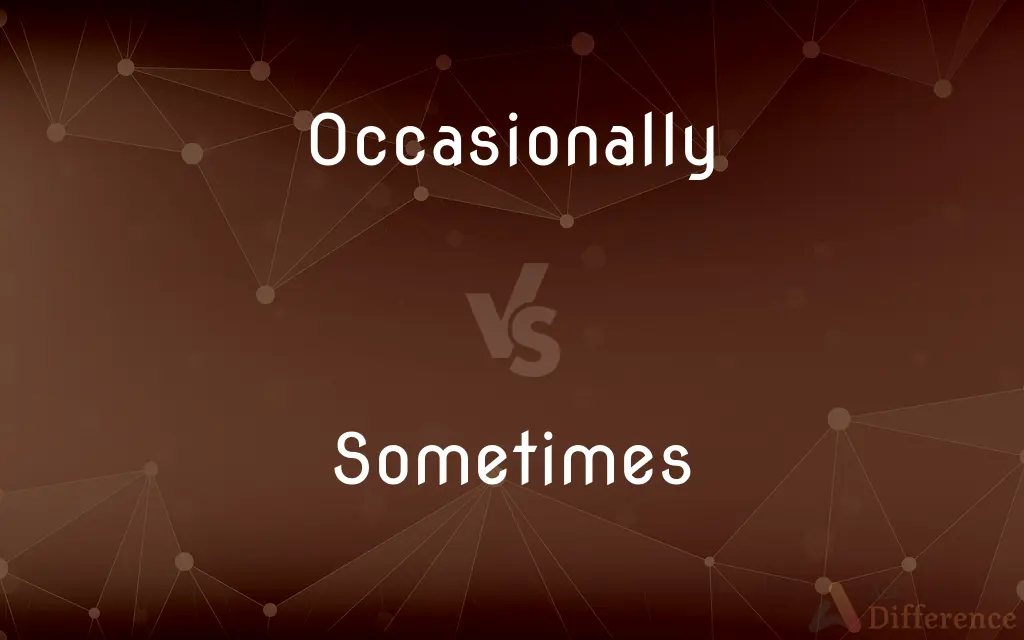Occasionally vs. Sometimes — What's the Difference?
By Tayyaba Rehman & Urooj Arif — Updated on April 4, 2024
Occasionally implies infrequent or not regular occurrences, while sometimes suggests a somewhat more frequent or regular pattern of happening.

Difference Between Occasionally and Sometimes
Table of Contents
ADVERTISEMENT
Key Differences
Occasionally is used to describe events that happen infrequently and with irregular intervals, suggesting a rarity or special circumstance. For example, one might say, "I occasionally go to the opera," implying that such outings are rare and not part of a regular routine. On the other hand, sometimes indicates a higher frequency and a more regular occurrence, though still not consistently. Saying, "I sometimes go to the gym during the week," suggests a pattern or habit that occurs with some regularity, though not all the time.
While occasionally gives a sense of unpredictability and special occurrence, sometimes offers a sense of routine without commitment to regularity. This distinction is important in conveying the exact frequency and regularity of an event or action. For instance, "occasionally visiting the museum" could mean a few times a year, whereas "sometimes visiting the museum" might imply visits that occur several times throughout the year, albeit without a set schedule.
In terms of planning and scheduling, occasionally may be used to suggest that an event or activity is not a priority and happens more spontaneously. Meanwhile, sometimes could be interpreted to mean that the event or activity is part of a flexible but recognized pattern, suggesting it holds a more significant place in one's routine or preferences.
The choice between occasionally and sometimes can significantly affect the listener's or reader's understanding of frequency and regularity. For example, "I occasionally eat out" might prepare someone to hear about special dining experiences, while "I sometimes eat out" sets the expectation for a regular part of dietary habits, though not frequent enough to be considered a constant.
Comparison Chart
Frequency
Infrequent and not regular
More frequent and somewhat regular
ADVERTISEMENT
Regularity
Irregular intervals
More regular occurrences
Predictability
Unpredictable, special occurrences
Predictable pattern without consistency
Planning
Implies spontaneity, not a priority
Part of a flexible routine or habit
Interpretation
Seen as rare or special outings/events
Part of routine but not constant
Compare with Definitions
Occasionally
Used to describe infrequent actions or events.
She occasionally contributes articles to the magazine.
Sometimes
Can suggest variability within a routine.
She sometimes works from home, depending on her schedule.
Occasionally
Implies a lack of predictability.
Occasionally, he would surprise her with gifts.
Sometimes
Not always but more than rarely.
We sometimes choose to vacation in quiet, rural areas.
Occasionally
Not forming part of a regular pattern.
Occasionally, I indulge in a luxury spa day.
Sometimes
Indicates a moderate frequency.
Sometimes, I feel like I need a break from everything.
Occasionally
Denoting rarity or special occurrences.
We occasionally see snow in this region.
Sometimes
Implies some level of regularity.
Sometimes, on weekends, we have a family movie night.
Occasionally
Happening at irregular intervals.
I occasionally visit my hometown.
Sometimes
Happening now and then, or at certain times.
Sometimes, I prefer walking to work.
Occasionally
Now and then; from time to time.
Sometimes
At times; now and then.
Occasionally
(obsolete) On the occasion of something else happening; incidentally, by the way.
Sometimes
(Obsolete) At some previous time; formerly.
Occasionally
From time to time; sometimes; at relatively infrequent intervals.
Sometimes
On certain occasions, or in certain circumstances, but not always.
Sometimes I sit and think, but mostly I just sit.
Occasionally
(obsolete) By chance; accidentally.
Sometimes
(obsolete) On a certain occasion in the past; once.
Occasionally
In an occasional manner; on occasion; at times, as convenience requires or opportunity offers; not regularly.
The one, Wolsey, directly his subject by birth; the other, his subject occasionally by his preferment.
Sometimes
(obsolete) Former; sometime.
Occasionally
Now and then or here and there;
He was arrogant and occasionally callous
Open areas are only occasionally interrupted by clumps of trees
They visit New York on occasion
Now and again she would take her favorite book from the shelf and read to us
As we drove along, the beautiful scenery now and then attracted his attention
Sometimes
Formerly; sometime.
That fair and warlike formIn which the majesty of buried DenmarkDid sometimes march.
Sometimes
At times; at intervals; not always; now and then; occasionally.
It is good that we sometimes be contradicted.
Sometimes
Former; sometime.
Thy sometimes brother's wife.
Sometimes
On certain occasions or in certain cases but not always;
Sometimes she wished she were back in England
Sometimes her photography is breathtaking
Sometimes they come for a month; at other times for six months
Common Curiosities
Can occasionally and sometimes be used interchangeably?
While they can sometimes be used interchangeably in casual conversation, their nuances suggest different frequencies and regularities of events or actions.
Is occasionally less frequent than sometimes?
Yes, occasionally is generally used to describe events that happen less frequently than those described by sometimes.
How does the use of occasionally affect the perception of an event?
Using occasionally implies that the event is special or rare, making it seem less routine and more unique.
How can the frequency of an event be described using occasionally or sometimes?
Occasionally might describe events happening a few times a year, while sometimes could describe events happening monthly or weekly.
What is the main difference between occasionally and sometimes?
Occasionally refers to infrequent and irregular occurrences, while sometimes indicates a somewhat more frequent and somewhat regular pattern.
Can an action described as occasionally become sometimes?
Yes, if the frequency of the action increases over time, it may be more accurately described as sometimes.
How do cultural contexts affect the use of occasionally and sometimes?
Cultural contexts can influence the perception of frequency and regularity, potentially affecting the interpretation of these terms.
Are there specific contexts where occasionally is more appropriate than sometimes?
Occasionally is more appropriate for events that are rare or noteworthy, whereas sometimes is better for events that occur with some regularity.
Does sometimes imply a routine?
Sometimes can imply a flexible or loose routine, suggesting that the event happens with some regularity but not constantly.
Can the choice between occasionally and sometimes change the meaning of a sentence?
Yes, the choice can subtly change the listener's or reader's understanding of how frequently and regularly an event occurs.
How does occasionally relate to unpredictability?
Occasionally conveys a sense of unpredictability because it describes events that do not follow a regular pattern.
How do occasionally and sometimes contribute to language richness?
These terms enrich language by allowing nuanced expression of frequency and regularity, adding depth to descriptions and narratives.
Is sometimes a good word to describe habits?
Yes, sometimes is suitable for describing habits that are not consistent but occur with moderate frequency.
Why is it important to choose between occasionally and sometimes accurately in communication?
Accurate choice enhances clarity and ensures the intended frequency and regularity of events or actions are correctly understood.
Can the frequency implied by sometimes be quantified?
While sometimes suggests a moderate frequency, quantifying it precisely depends on the context and is subjective.
Share Your Discovery

Previous Comparison
Phantom vs. Spectre
Next Comparison
Environment vs. EcologyAuthor Spotlight
Written by
Tayyaba RehmanTayyaba Rehman is a distinguished writer, currently serving as a primary contributor to askdifference.com. As a researcher in semantics and etymology, Tayyaba's passion for the complexity of languages and their distinctions has found a perfect home on the platform. Tayyaba delves into the intricacies of language, distinguishing between commonly confused words and phrases, thereby providing clarity for readers worldwide.
Co-written by
Urooj ArifUrooj is a skilled content writer at Ask Difference, known for her exceptional ability to simplify complex topics into engaging and informative content. With a passion for research and a flair for clear, concise writing, she consistently delivers articles that resonate with our diverse audience.













































